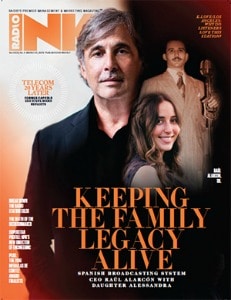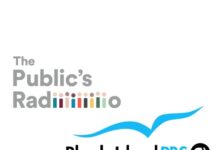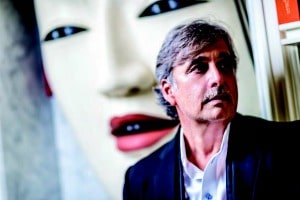
3-21-2016
BY EDITOR-IN-CHIEF ED RYAN
The Alarcón family has been involved in Spanish-language radio since the 1950s, when Pablo Raúl Alarcón, Sr. established his first radio station in Camagüey, Cuba. After coming to the United States, he founded Spanish Broadcasting System in 1983, and today it is the largest Hispanic-controlled radio broadcasting company in the U.S., with 20 FMs located in six of the largest U.S. Hispanic markets, including Los Angeles, New York, Puerto Rico, Miami, Chicago, and San Francisco.
SBS today is led by Raúl Alarcón, Jr., who became chairman when the company completed its IPO in 1999. He’s been CEO since June 1994, and president and a board member since October 1985.
The company has evolved since its days as solely a radio company: SBS has gotten into television, entertainment, big concerts and other events, and has launched a comprehensive and aggressive digital strategy it hopes will gain the loyalty of the next generation of Hispanic listeners, who are very much about the shiny new apps and devices.
Alarcón’s daughter Alessandra (he has three children) started with the company two years ago and now works as marketing director at SBS’s Los Angeles cluster, and Alarcón considers her an important part of the younger generation that is breathing new life into the company.
He also talks about his legacy at SBS and how he would like nothing better than to head to his little place in the Bahamas, where he can watch TV, listen to music, and put his feet in the sand, while someday handing the keys to the company over to Alessandra.
RI: You’ve been involved in the company since the ’80s. Do you still love it?
Alarcón: Absolutely. I love it. It’s the passion of my life, and it has been since the early ’80s. We are going to be celebrating, now, our 33rd year of operations. The wonderful thing about a company like SBS is that it has evolved over time — particularly, I would say, in the last maybe seven or eight years.
For the longest time, we were a terrestrial radio company. However, we’ve been able to successfully transition the company into areas and strategic initiatives that we have never really done before. For example, network radio. We had never really been a network radio operator, and we are doing that very successfully now.
We were never in television, and then we got into television, and it was actually about the worst possible time to get into television. But we did, and, beyond any fear of contradiction, I would say that I am very happy to have developed a TV strategy. Although we are not the biggest TV player around, certainly not around the Spanish universe, we do our own proprietary programming and we have our own HD studios for all of our regional content, and that’s going to lead us to other things in the future.
We’ve also gotten into the digital world, which I consider to be the next frontier for the company, along with new personnel we have coming into the company, like my daughter. We’ve done a lot with concerts and events. We never used to do that, really, on a grand scale. Now we are doing it on a much grander scale than ever before.
All of these things, interestingly, are coalescing. They are all coming together in what I consider to be a very strong virtue that we have at the company: We are able to play in all these areas successfully. Obviously, we focus on the Hispanic market, but we are well positioned within the Hispanic market to be able to do a lot of lucrative things, and a lot of things to be able to serve the Hispanic consumer on a national basis.
RI: What is it about radio that you love?
Alarcón: I think the immediacy of radio is something that has never truly been replicated, except maybe now, with the advent of digital. But the localness of radio, the one-on-one that has always been part of its DNA, the fact that no matter what, it is still a mass medium — and I don’t care what anyone says, that’s been proven. We certainly have proved it in our markets.
Radio, I think, will always be around because it combines certain things that are very difficult to combine: the immediacy of it, along with the mass reach, and the local aspect of radio. Now that doesn’t mean this is a panacea in the sense that there’s nothing left to do. A lot more innovation needs to be brought into radio. Digital can bring a lot of innovation to radio. We’ve found that there’s a lot of sharing between our radio and digital platforms, particularly LaMusica, which we recently launched. But to answer your question, yes, I still love radio. It is still my passion. It’s a very efficient business, unlike others — unlike television, where you need to make a tremendous investment and then you’re rolling the dice hour by hour. It’s like a monster that has to be fed every hour. Radio is very efficient, very local, and yet it is mass and it is immediate. Those are things you will just never be able to take away from radio. I think it will always have that longevity. It’s a very exciting medium, as far as I’m concerned.
RI: When you are specifically targeting the Hispanic audience, what does it take to win that battle for ears?
Alarcón: How we do it is a combination of the programming and the music and the content. It’s not only the songs, it’s what goes between the songs that, for us, has always been paramount. New York, Los Angeles, Miami, they are all very different markets. The strength of radio is local. You have to be in tune with what’s going on; we do a tremendous amount of local identification with what’s going on in the Latino market, in terms of trends and in terms of musical trends.
Sometimes you have to be the trendsetter. It’s not just that you identify a trend and you follow it because it’s happening, sometimes you’ve got to actually make it happen. Just like the music, on-air talent, and content are important, and we spend a lot of time on them, we’re trying to find the right combination of people with the right combination of music for the particular market. It’s Radio 101, in the sense that these are some of the things that you could’ve asked me 10 or 15 years ago and I probably would’ve answered the same way, except that now, I think because of everything that’s happened in regular media, terrestrial media, I think you need to be much more — I don’t know if the word is discriminating, but we need to be a little bit more careful. I think you need to focus a lot more than you used to in the past. These are the things that, thankfully, the people at this company have been able to do successfully.
RI: Why is it important for radio to bring young people like your daughter into the business?
Alarcón: You need to bring in young people, aggressive people that have a different outlook. Not only do they have a different outlook, but they have a different style. I have some very good people working at the company, obviously all types of ages, of course. Jesus Lara, along with my daughter, are perfect examples of this new executive, the young Hispanic executives, who, by the way, are fluent in Spanish and English and have a grasp of the marketplace.
They know what’s going on, and they are much smarter, I think, than when we were youngsters getting into this business. They have a new outlook. They have a new approach to things. They have a tremendously vast array of technology they can bring to bear on a subject. They are people I am trying to attract to the company to take it to its next level.
RI: Alessandra, tell us about how and why you got into the radio business.
Alessandra Alarcón: I graduated college and I did some traveling. I started working at the company about two years ago. It’s an honor. The strength of SBS nationwide and the growth and the importance of the Hispanic population showed me how much of an opportunity I had to work for my father and what a great company it was to work for. I feel really passionate about it.
The more educated and the more successful Hispanic millennials become, I feel, the more opportunities we have to reach them. We are positioned in a very unique way. It’s exciting to work at SBS and work for my father and where my grandfather worked before me. I mostly have tackled marketing here locally in L.A. while also trying to learn the business, trying to learn what we’re doing with LaMusica, and working on a corporate level as well.
To touch on your earlier question about radio, I feel that a lot of people thought that radio was going to disappear with satellite radio and then with the Internet and social media. People thought that radio would die. I think the most interesting thing is that wasn’t the case at all. Radio is for the masses. It’s not going anywhere. There are only ways to expand on it, and that’s where I hope to grow and to contribute to the company as best I can.
RI: You are the social media generation. What are your thoughts on that, and how do you see it weaving into the company?
Alessandra: We definitely have social media integrated in every single market. We use it not only to push our brands and our shows and our talent and grow our company, but also to serve advertisers. We try to get creative with it. Again, I think that’s where the young blood really is important, to have those young people in the company so that we can do it in a creative way instead of just slapping logos on things. The millennial population don’t like distractions. They’re very savvy. You have to be creative. That’s where that young blood actually comes in, and it’s very beneficial. We definitely have been kind of pioneers in that as well, where we’ve really taken the time to put effort and to grow our social media and make sure that we are involved in it.
RI: Mr. Alarcón , what are you seeing as far as the advertising market, the economy out there? For both radio in general and the Hispanic audience?
Alarcón: I don’t mind telling you, I think anybody involved in media, certainly on the business side of media, for the last seven or eight years, it’s been tough. It’s been very tough. It was a compendium of things that were happening at the same time. I remember, the tail end of 2008, the world was coming apart, financially. I sat down with my CFO and I said, “You remember that funny word ‘adapt’?” And my CFO says, “Oh, God. What have you got up your sleeve?” I said, “We are going to have to adapt.” I said, “I’m looking at numbers here, and we’re going to have to go back to the days when we really operated this with a very critical eye, with people doing a number of different tasks.”
I think we eliminated about a third of all our positions between 2008 and 2010 or 2011. And I don’t say this with pride, I only point to this in terms of adaptation. We were able to successfully transition to a much smaller and nimbler rank and file. It wasn’t easy. You have to do that appropriately and know where to eliminate, as opposed to just eliminating.
I had the conversation the other day with someone who said, “We have to cut 15 percent from everything, across the board, in this particular category.” I said, “No, no, that’s not the way we’re going to do it. We’re going to do it surgically.” And we are going to end up, hopefully, with just the same amount of impact that we have in any particular division or business unit. But we’re going to have to be much more nimble and we are going to have to adapt, and we’re going to have to do it very efficiently.
What I’ve seen now, lately, after five or six years of that, is the combination of integrated packages, combining different media and bringing it on a national level — as opposed to before, which would’ve been more regionalized or local — and being very creative in how we approach the advertisers.
The advertiser now is all about, “Show me,” and, “I want to see results,” and, “I want to move product.” You have to be able to live and work at different levels in the media we have, certainly in our company, to be able to show the advertiser what we can do. That is the future. I think the future is being able to adapt to all of this technological change in an efficient way.
We are obviously still for-profit, so we have to make money. How do we do that in an efficient way and get advertisers the results they want? What I’m seeing is that it takes creativity, it takes a tremendous amount of focus and discipline. As opposed to having 100 people do something, maybe you have 20 people do something, but they’re very focused, they are blue chip people, they know what they’re doing, and they are able to combine different elements that the company has to offer advertisers. That is what’s very exciting to me — when I say that, I mean radio, I mean concerts and events.
RI: Give us an example of what you are doing with events and concerts.
Alarcón: We just started doing some experimentation with live events and digital, having an app there at the stadium, at the event, where listeners right there can win a backstage visit with the artist. Very innovative. Let me tell you something, the advertisers love it. They put down their pencils and say, “What is this? What are you talking about?”
We had this massive event at Marlins Park, the first time a music event had ever been done at Marlins Park in downtown Miami. We were able to expose the app there for the first time. We did some very unique testing of exactly what I’m talking about, being able to combine all these things, or having the music and the artists as the central aspect, the central entertaining feature for the consumer. And we had Sprint there, we had a bunch of people there that were just blown away by what we were able to do at a massive event like that.
I think that type of creativity, and being able to parlay all of the different formats for the benefit of the advertiser — and not boring the consumer, because their attention span is extremely short — I saw the power of that, that day, and I have seen it since. Advertisers are very excited. It is the first time in this digital world that I’ve heard that. Advertisers say, “OK, we can’t wait for that. I like the excitement of this. Tell me a little more about this. Could we do this in other markets? Could we do this on a national basis?”
These kinds of things, that I think are becoming more and more the vernacular we are seeing every day, is what we’re trying, and beginning, to focus on now. None of this is easy. Obviously, it’s 10 times more difficult than in 1986. But it’s also very rewarding, and if we are able to do it correctly and know where to invest in terms of these properties, again, I think that is foreboding of a very good future for us. Again, everything I am telling you, I am speaking of from the Hispanic market perspective. I am telling you my opinion as to how to move the Hispanic market.
RI: You mentioned you had to cut your workforce. How do you manage people, and how do you want your people to manage people to get the most out of them and have them happy working at your company?
Alarcón: In many ways, the reality of the marketplace is not absent for anyone. I don’t mean to be mysterious in what I am saying; I am saying that people in this business know that the ’90s are gone. It is not a matter anymore of having three and half people do the job of two. That’s something that’s permeated the mindset of the people that still love media and want to be in media. That’s easily said. Obviously, we’re trying to infuse our people with not only a love of the company, but a love of the marketplace and the people that we are addressing and the ones that we’re servicing, that we are broadcasting to and entertaining. That’s very hard.
I wish I could tell you that I had an absolute road map of what to do and how to manage a meeting of managers and tell them what to do. I know that we have tried to tell them for the last five or six years that in order to survive in this marketplace now, first of all, you have to be committed to it. And if you’re not committed to it 100 percent and you’re not willing — and
I have to start with myself, though, if I am not willing to wear five different hats — I shouldn’t be in this business, because it’s no longer the days of old.
Those were wonderful days, and you look upon them and smile and remember. 1984 radio, what it used to be like, that’s gone. In today’s age, you need to be at the top of your game, you need to be very creative. You try to instill a camaraderie among the troops in terms of the company. Those are noble things that would be done at any company.
But I think the onus and the burden is on us to be able to communicate effectively to our people that — and it sounds harsh, but this is the way of the future — if you are with us, you’re going to succeed. If you are lackadaisical, if you’re not committed, if you think this is a time where you can just do half of a job and then go home, this company, and certainly this industry, is not for you. I would like to think that at this company we are making progress on that. It’s never easy, because humanity being what it is, that’s sometimes difficult to communicate and to get people to accept.
I think if anything good came out of the calamitous last few years, it’s been that people are at least approachable with the idea that “Well, I am going to have to go the extra mile if I want to be in this business.” And there are still many, many people that love this business. What we’re trying to do is find those people. There may not be many of them, but you find the right ones and put them in the right places doing the right things in the right division, and get them all to work together. Which is another challenge — that’s true of any business.
In these times, when a person has to wear two or three hats, getting them to communicate with each other is really what we’re trying to establish at the company, and getting people in different divisions to work together. Because, as I said before, we want to be able to have all of this work together efficiently, not only for the consumer, but for the advertiser. Getting them to communicate with each other is, I would say, the number one challenge.
RI: What is your vision for the future of the company?
Alarcón: I am a firm believer in radio. I don’t make any bones about that. So if your question is, would I be amenable to acquiring other radio properties to fortify the footprint that we currently have in the United States — we are currently operating in six of the largest Hispanic markets, but there are a few markets, Chicago and San Francisco come to mind — where we only have one station. Would I like to have another station? Absolutely.
I am not part of the naysayers that feel that radio is done and we don’t need any more radio stations. For everything that I’ve already said to you, I am a big believer in radio. I would absolutely look favorably upon growing in radio. Obviously we have always been a large-market operator, so we would probably refine our focus into larger markets. But yes, I would certainly want and not turn away opportunities, as long as we can fit them into the model that we’re building and make it a cross-platform opportunity for us.
I think the Hispanic market continues to grow. All of this xenophobia you hear regarding immigration and the multi-cultural aspects of this great country, in a way, is helping. It brings us more together in terms of Hispanic audiences. I think they’re becoming more aware of their position in American society. I think radio and television and the concerts and the digital, all of that, reinforces their historical roots and culture. Music is a big part of that. Entertainment is obviously a big part of that.
If you’re asking me the question as the head of SBS, I would say yes, I would look very favorably, prudently, at that. The days of — and I’ve been guilty of this — of paying exorbitant prices for a radio station in a major market, I don’t think I could do that now. But I would say that in radio, I still continue to believe in it and I would still be a buyer. If we could find the right property in the right market and have the right deal come along, I certainly would not turn that down.
RI: What is your vision for your family and the company?
Alarcón: There is nothing that I would like to do more than to go to my little place in the Bahamas. It’s very nice and peaceful there. Nobody bothers me. I go out to the beach. I come back and I watch TV. I listen to a little music. I go back to the beach again.
My oldest daughter has shown to be adept at this, much more than I was at her age, much more adept at surviving in the corporate world. She’s only been in it two years, but she’s done some great things out in Los Angeles, wonderful things in terms of marketing, in terms of programming suggestions. For me, if she were able to grow into a position where she could be, hopefully at some point in the not-too-distant future, the head of this company, with her intelligence, her youth, her vitality, and her outlook on the company and her savviness, there would be nothing that would give me more pleasure and pride than to be able to hand over the reins to her.
I just hope I am not shooting too high for her expectation levels. This is something that would give me tremendous pleasure and pride. I don’t want her to be inundated with all of the things that, of course, I have to handle on a daily basis. I’d like her to evolve. She’s evolving very quickly, much more quickly than I did. That, for me, would be a dream realized if that were able to happen.
Alessandra: It’s big shoes to fill, Dad. Very big shoes to fill. But absolutely, I want to further the legacy that my father started. It’s an honor to work with him. He’s amazing. We all know. I think you’re a genius, Dad. You don’t think so, but you are. To be able to continue that legacy and to be able to keep it in the family, as well as serve our community and grow what we have here, which I think has unlimited potential, is something that I would like to do, as long as I can keep proving myself. I work hard. If I can show that I have that strength and that intelligence, then that is the role I would like to step into one day.
RI: Alessandra mentioned the word legacy. What do you want your legacy to be?
Alarcón: Obviously, this is a company where the roots of everything that we’re talking about now go back to my father, who became an on-air disc jockey in 1948. Our particular story is one that’s not an unusual story with respect to the whole question of being a refugee. Not so much an immigrant as a refugee. They’re similar, but they’re different.
You know Cubans, of course, left their homeland, not necessarily looking for a better life, but in the case of the Cubans and the great migration of Cubans beginning in 1959 and 1960 throughout the ’60s and the ’70s, it was basically to survive. My father had a very tough time. My father left his homeland when he was 35 years old and he didn’t speak English. All he knew was radio. By the time he left Cuba, he already owned a couple of stations, not in Havana, but in the province where he was from. It was very tough.
Before he passed away, may he rest in peace, he saw the company was able to accomplish great things. For me, it would be to be able to have my daughter continue what he started back in 1948 because of his love of radio. That’s really what it was; it was nothing other than the fact that he loved being on air and he loved being a radio personality. That’s what he loved his whole life. To be able to pass this on to my daughter and to the new generation and to have them take it to another level, the legacy would be to take that to certainly a grander expression, not only in the United States, but throughout the Latin world. That would be something I would very much want to see before my days are over here. And if I can help in any way my daughter and other young people to be excited about this opportunity, then I would’ve said that I did my part to continue the legacy and have it moving forward. *










